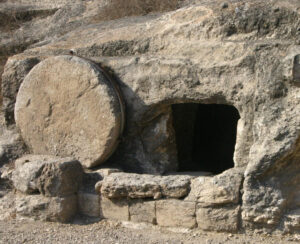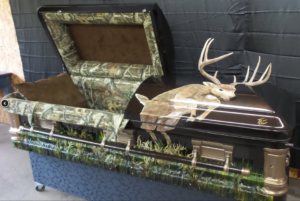The Man Who Cannot be Saved (Romans 8 / Personal Indwelling)
Commonly Declared Summary: In the personal indwelling view of Romans 8, one must obey the gospel to be in the Spirit, but one must be in the Spirit to obey the gospel.
It seems to me that the prevailing view in churches of Christ about the indwelling of the Holy Spirit contradicts the very passage cited as establishing position’s foundation: Romans 8.
Romans 8:6-11 reads:
For to set the mind on the flesh is death, but to set the mind on the Spirit is life and peace. For the mind that is set on the flesh is hostile to God, for it does not submit to God’s law; indeed, it cannot. Those who are in the flesh cannot please God. You, however, are not in the flesh but in the Spirit, if in fact the Spirit of God dwells in you. Anyone who does not have the Spirit of Christ does not belong to him. But if Christ is in you, although the body is dead because of sin, the Spirit is life because of righteousness. If the Spirit of him who raised Jesus from the dead dwells in you, he who raised Christ Jesus from the dead will also give life to your mortal bodies through his Spirit who dwells in you.
For many, the passage seems to create a clear distinction between those who are in Christ and those who are lost. That distinction is perhaps best summarized by these words: “Anyone who does not have the Spirit of Christ does not belong to him.”
How could the Bible make the statement any more plainly? To be in Christ is to have His Spirit and to have His Spirit is to be in Him.
The seemingly necessary and reasonable conclusion is that every Christian must the receive the personal indwelling of the Holy Spirit. But a closer examination of this text will show there is at least one difficulty with that approach.
The Personal Indwelling View of Romans 8:9
First, there are four points that the personal indwelling view draws from verse 9:
- Whenever the Spirit dwells in a man, that man is “in the Spirit.”
- Every man who is a Christian has the Spirit dwelling in him.
- Every man who is a Christian is “in the Spirit.”
- Every man who is not a Christian is “in the flesh.”
These four points do seem to support the personal indwelling view’s foundational tenet that every man who is a Christian has the Holy Spirit, and no man who does not have the Spirit is a Christian. The belief seems to fit the clear words of the text and seems to be in harmony with the rest of the New Testament’s teaching on the universal nature of the indwelling of the Holy Spirit.
Consequences of the Personal Indwelling View of Romans 8
However, it is verses 6-8 that create a great difficulty for this view. Consider the following thoughts:
- With the understanding outlined above it must be argued that anyone who is “in the Spirit,” is no longer “in the flesh” – “You, however, are not in the flesh . . . if in fact the Spirit of God dwells in you” (v. 9).
- No man who is “in the flesh” belongs to Christ (is a Christian) – “. . . in the flesh . . . Anyone who does not have the Spirit of Christ does not belong to him.”
- Those who are “in the flesh” have the “mind of the flesh” (v. 6) and have their minds “set on the things of the flesh” (v. 7).
Paul’s affirmation is that those who have their minds “set on the flesh” cannot submit to God’s law (v. 7). It follows then that only those who “are in the Spirit” (v. 9) and so have their minds “set on the things of the Spirit” (v.5) do submit to God’s law and “live according to the Spirit” (v. 5).
Also, those who are outside of Christ cannot submit to God’s law (v. 7) because they are:
- Without the Spirit (v. 9).
- “In the flesh”(v. 9).
- And have their minds “set on the things of the flesh” (v. 7).
Again, there is nothing particularly troubling with those thoughts until this question is asked:
“How does the man who is ‘in the flesh’ ever obey the Gospel?”
The act of obeying the gospel is an act of submission to God’s law. Yet, verse 8 unilaterally affirms that those who are “in the flesh” cannot please God. In order to please God, they would have to “mind the things of the Spirit” without ever being “in the Spirit.” The problem can be stated in this manner:
- If it is impossible for those who are “in the flesh” to submit to God’s law (v. 7);
- And it is true that all men who are outside of Christ do not have the Spirit (v. 9);
- And it is always true that those same men have their minds “set on the flesh” (vs. 6-7);
- Then those men “in the flesh” have no possibility of ever submitting to God’s law.
The Personal Indwelling and Repentance (Romans 8:13)
The personal indwelling view faces yet another contradictory problem in Romans 8:13: The man “in the flesh” cannot repent:
- Paul affirms that it is by “the Spirit” that we “put to death the deeds of the body” (Romans 8:13).
- According to the personal indwelling view the man “in the flesh” is outside of Christ and so has no access to the Spirit.
- If he has no access to the Spirit, he then cannot “put to death the deeds of the body” by the Spirit. How then can he ever repent?
The personal indwelling view places the lost man in a position where he cannot repent, cannot submit to the law of God, and so therefore, he can never be saved.
Romans 8 and Titus 3
The situation becomes even worse when these thoughts are put together with how many personal indwelling advocates view Titus 3:5-6:
[He] saved us, not because of works done by us in righteousness, but according to his own mercy, by the washing of regeneration and renewal of the Holy Spirit, whom he poured out on us richly through Jesus Christ our Savior . . .
From that passage we are told:
- It is in baptism (the “washing of regeneration”) that we receive the “renewal of the Holy Spirit.”
- The renewal equates to the gift of the Holy Spirit found in Acts 2:38.
- The function of the renewal is explained by Ezekiel 36:26-27:
- And I will give you a new heart, and a new spirit I will put within you. And I will remove the heart of stone from your flesh and give you a heart of flesh. And I will put my Spirit within you, and cause you to walk in my statutes and be careful to obey my rules.
- In baptism, God’s work is the renewal of our hearts.
- The heart of stone is replaced by the heart of flesh of which Ezekiel speaks.
- The renewal occurs at baptism when God makes His Spirit to dwell within us.
In other words, the work of God described in Titus 3:5-6/Ezekiel 36:26-27 occurs:
- The moment that we become the possession of Christ.
- The moment that we are transferred from being “in the flesh” to being “in the Spirit.”
Further, we are told that after conversion the indwelling of the Holy Spirit strengthens us and provides us the “moral power” to stand against sin and empowers us to “put to death the deeds of the body.”
From a redemptive standpoint, Titus 3 puts the personal indwelling position in a worse condition than Calvinism. The Calvinist allows for the Spirit to come upon man BEFORE he obeys the gospel. In fact, they argue the Spirit’s irresistible influence is necessary upon those who are “in the flesh” because those “in the flesh” cannot obey God on their own. In that one point, their view is consistent with the prevailing understanding of Paul’s declaration in Romans 8.
In our stand against Calvinism, we (until recently) in churches of Christ have vehemently argued that those in the world cannot and do not receive the Spirit. We argue that the Spirit comes upon man only AFTER he obeys the gospel.
But in so doing, we create a great difficulty from these texts (Romans 8/Titus 3). That difficulty is summarized as this:
- Those who are in the flesh are those who have the heart of stone.
- It is impossible for those who have a heart of stone and have their minds set on the things of the flesh to obey God’s law.
- The Holy Spirit is necessary to “put to death the deeds of the body.” And no man “in the flesh” has access to this power.
If it is only at conversion the heart of stone is replaced with the heart of flesh; we are renewed by the Holy Spirit; become those who are now “in the Spirit;” and the Spirit’s indwelling strengthens us in our fight against sin, then:
What mechanism exists to move man from having a heart of stone that cannot obey God’s word to having a heart of flesh that God “causes to walk” in His statutes?
In answer to that question, we have quickly and rightly argued that it is the preaching of the gospel that calls a man to salvation. But that is precisely the dilemma the personal indwelling view of Romans 8 faces.
The personal indwelling view uses this text to establish that the indwelling of the Spirit is not a “word-only” operation. We are told the indwelling of this passage is the special blessing of Christianity. It is the gift of the Spirit only Christians receive. It is the seal of the fact that we are Christians.
All those “truths” necessitate that no lost individual can ever receive the benefits of the indwelling of Romans 8 – in any way. The personal indwelling view of Romans 8 necessarily precludes the Spirit’s indwelling from influencing one who is not yet a Christian. Yet, Romans 8 demands that it is only those who are influenced by that same indwelling that can obey God. The result is this self-contradictory conclusion:
In the personal indwelling view of Romans 8, one must obey the gospel to be in the Spirit, but one must be in the Spirit to obey the gospel.
The man “in the flesh” can hear the preached gospel but can never respond to it. He cannot be “in the Spirit” because so long as he resides “in the flesh” he cannot have the Spirit of Christ. And as the personal indwelling view excludes a direct operation of the Spirit upon the heart of the sinner (i. e. Calvinistic influence), proponents of that view have no mechanism by which a man can be saved.
Conclusion
In short, the challenge faced by the personal indwelling view of Romans 8 is to find a way for a man who is “in the flesh” to have his mind “set on the things of the Spirit.” The view must show how a man can be “in the Spirit” without the Spirit of Christ dwelling in him. The problem for the personal indwelling view is that is the very condition Paul defines as “impossible.” Unless one turns to Calvinism, another understanding of Paul’s meaning of “flesh” and “spirit” is needed.




